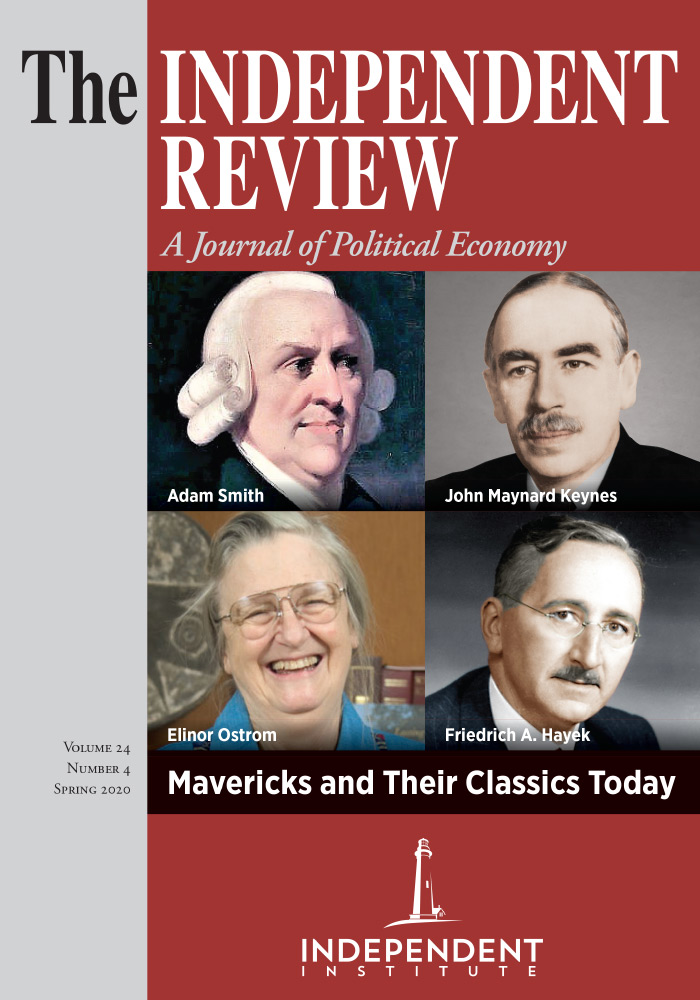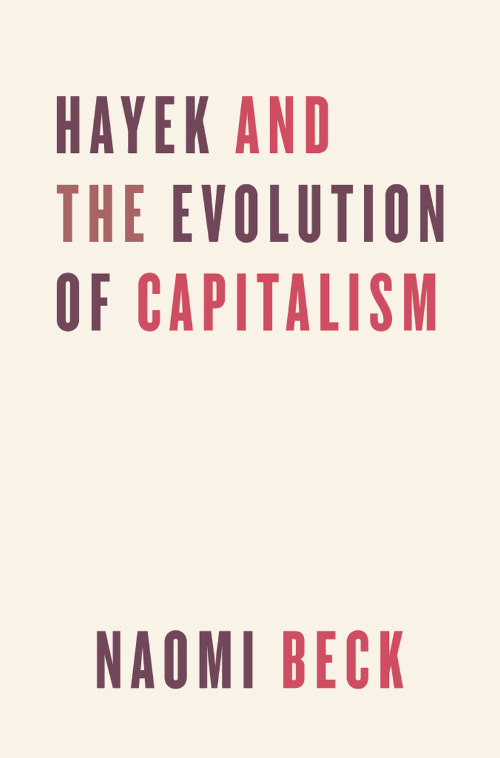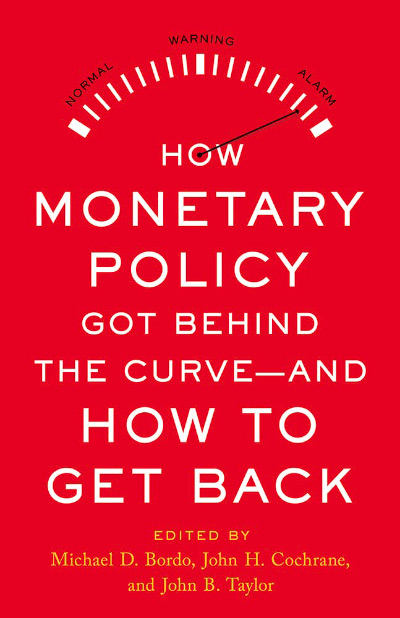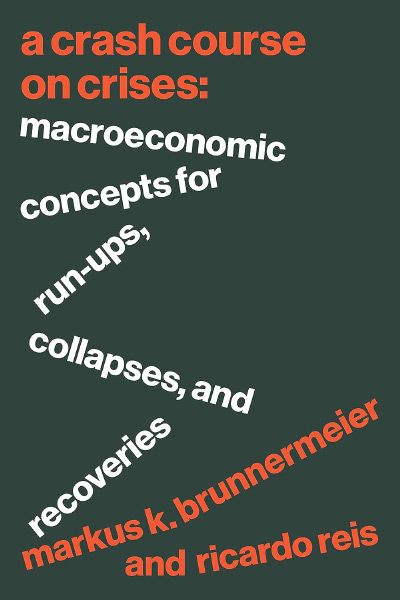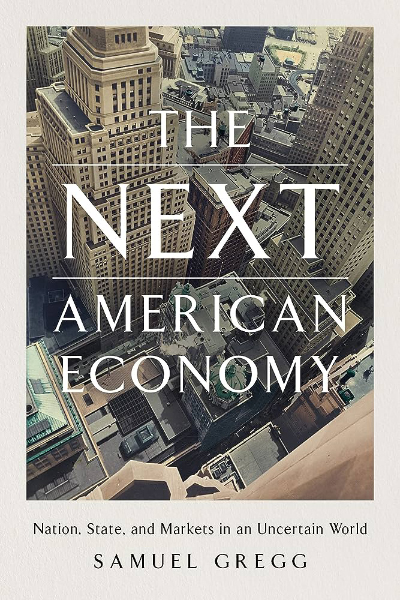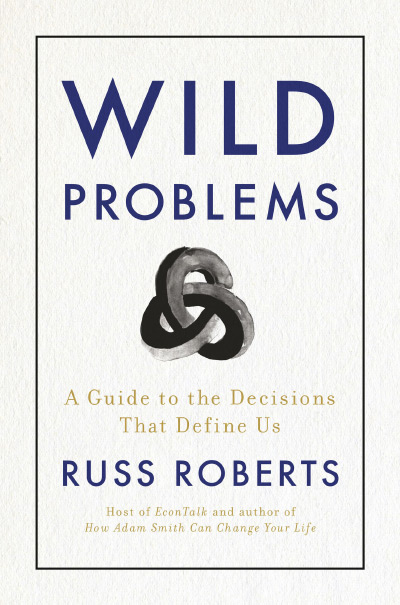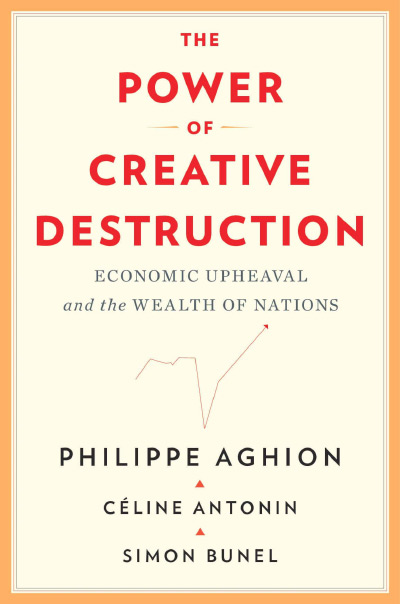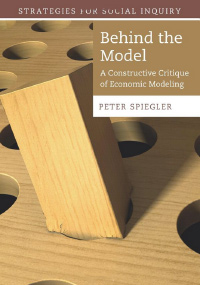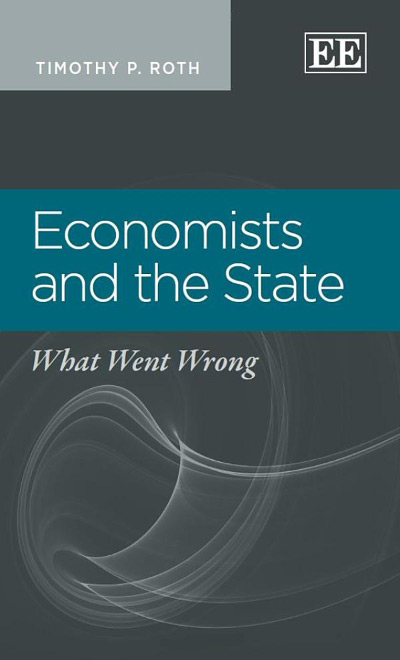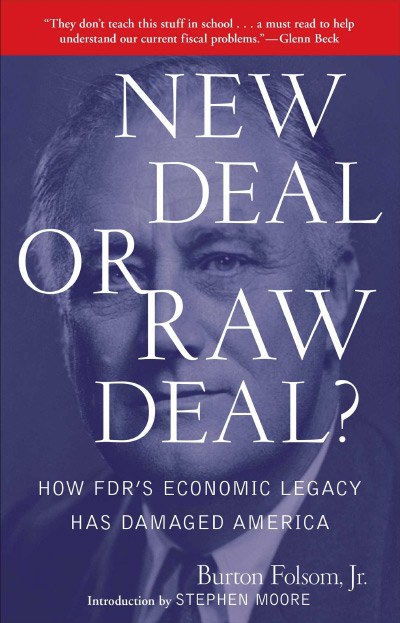F.A. Hayek had, of course, at least three careers, focusing first on explaining business cycles, and later on the role of price in conveying information, an important aspect of the “Socialist Calculation Debate.” It was only later in his career that his attention turned to social evolution (though not that late, since he was working on the problem from about 1950, when he moved to University of Chicago and published The Sensory Order and The Counterrevolution of Science, 1952). Naomi Beck focuses almost exclusively on Hayek’s work on social evolution, and it is fair to say that this is the area where Hayek himself ultimately aspired most to have an influence.
The book has three central claims regarding its core matter, which as the title suggests is Hayek’s theory of social evolution.
- Hayek’s core analytic organon is group selection, a concept that is not central, and is in many ways outside, the use of evolutionary theory in biology.
- Even given Hayek’s metaphorical conception of evolution, the work is under-theorized, and is not consistent with Darwin’s—or his followers’—notion of natural selection.
- Ultimately, Hayek’s conception of the direction of institutional evolution is mechanical and teleological. He claims evolution operates according to recognizable and inevitable laws, even though the participants in the process might have little or no understanding of the underlying causes or direction the evolution takes.
To foreshadow my own reaction, let me note that Beck’s critique of Hayek’s theory of evolution has considerable merit, taken on its own terms. But there is no reason I can see to take that view on its own terms, since it is largely a mischaracterization of Hayek’s project, and is in fact tendentiously mischaracterizing Hayek’s use of the concept of “evolution.” Many of Beck’s claims—in many cases anticipated by G. M. Hodgson (Economics and Evolution: Bringing Life Back into Economics New York: Cambridge University Press, 1993) and others—would be correct if Hayek were attempting to annex the mechanisms of biological evolution for his own purposes.
But he is not. This tired old view has been thoroughly debunked already, in several writings. One obvious one is Bruce Caldwell’s “Hodgson on Hayek: A Critique” (Cambridge Journal of Economics. 25: 539-53, 2001), which Beck does reference but has apparently not read, or at a minimum did not understand. To be fair, Hayek was vague about an important difference, a difference that lies at the heart of what I see as the understanding of the core explanandum. This distinction rests on the difference between (1) changes within a market system and (2) the path of growth and relative performance of societies, some of which depend on market systems and some of which do not.
The reason this difference is important is that what is “evolving” in the first case is structures (firms, etc.) pursuing profits and rents, operated by individuals. That is, the first explanandum is congenial to, and may require, methodological individualism. It would therefore also be congenial to the biological conception of evolution, relying on sources of variation and a mechanism for selection.
The second explanandum, by contrast, takes rule systems and institutions as the object of study. There are many in the “public choice” school, beginning with James Buchanan and Gordon Tullock (The Calculus of Consent, Ann Arbor: University of Michigan Press, 1962), who have thought of rule systems in just this way, but of course Buchanan and Tullock were thinking of consciously selected or “laid on” rules. Hayek, by contrast, conceived of the “evolutionary” process as using the survival mechanism for selection but thought of the process as operating at the level of more organic, collective structures such as rules. Capitalism is a thing; so is socialism. The evolutionary process is then a discovery process, at a very large-scale level.
That is my main criticism of Beck’s approach: she decisively proves that Hayek failed to use the biological metaphor of evolution correctly, when as Caldwell and others have already shown Hayek never pretended to use “evolution” in its biological sense. Further, and perhaps relatedly, the (apparently politically-motivated) dismissals that Beck quotes in the introduction, arguing that Hayek is simply unimportant and unknown in economics, are a misstep. These ad hominems—such as quoting political columnist Paul Krugman to the effect that Hayek is irrelevant—are simply unnecessary to the author’s argument. (One wonders why so much irrelevance spurred the author to write this book in the first place, of course.)
With no other evidence, Beck concludes that Hayek’s “ideas [have] long vanished from the professional discussion.” Well. According to Google Scholar, Hayek has been referenced 35,000 times, and has an h-index of 63, and that’s in the most recent “since 2014” date range. That’s not vanishing, that’s flourishing. A check of the narrower sample of economics journals on JSTOR reveals that Hayek was cited more than 150 times between 2013 and 2017. Yes, the comparable count for Krugman’s deity, Keynes, is more than 500, but my point is that Hayek is far from “vanishing.” (Besides, three hundred of those cites to Keynes were likely from the febrile Krugman himself.)
It is useful to give some background for my conclusion.
Evolution
As Peter Boettke often says, real policy analysis requires that the theorist is always a comparativist. In this case, the question comes down to learning: do societies that use “group selection” choose better policies, and do they do it faster than societies that seek guidance from an economic and social clerisy, technocrats trained to pull levers and twist dials to optimize the economy and larger social structure?
That is, the question is not whether evolution, or technocracy is perfect; both are riven with defects. The question is which might a society select? Perhaps such a selection is impossible. Still, if two otherwise similar societies happen to find themselves organized around evolutionary principles or planning principles, which learns faster and better?
Hayek, of course, thought that planning and what he called “socialism,” which ranged from state ownership of the means of production to substantial interference with and direction of prices, was literally impossible. It couldn’t work, and so a comparative perspective is not needed. This raises the question of what Hayek was really on about, and here I think Beck makes a good point. She claims, and I think she is right, that Hayek operated at a level of absolutes, of “either/or,” when it comes to the structure of society. As Hayek (The Counter-Revolution of Science, 1952 (reprinted 1980), Indianapolis: Liberty Fund) put it: “The central aim of all study of society must be to construct a universal theory of all mankind, understood a scheme of the necessary development of humanity according to recognizable laws” (p. 196).
Now, this would be an odd view of evolution by natural selection. There is nothing of the telos in Darwin, and in fact Darwin (and most of Darwin’s students) were very careful not to attach even ordinal conceptions of “improvement” to adaptation. All that is required for evolution is a source of variation—for biology, genetic mutation, especially in sexual reproduction—and a source of selection—for biology, either the competition for food and space, or the competition for mates in reproduction. The winners are those that can survive and reproduce, and that’s all that can be said.
Of course, there are those in evolutionary biology who note the tension between individual and group. Biologist E.O. Wilson put it this way, in his book The Meaning of Human Existence (New York: W.W. Norton, 2014, p. 32):
The competition between [selfishness and altruism] can be succinctly expressed as follows: Within groups selfish individuals beat altruistic individuals, but groups of altruists beat groups of selfish individuals. Or, risking oversimplification, individual selection promoted sin, while group selection promoted virtue.
That’s not risking oversimplification, that’s oversimplified. Even if you concede group selection, and you might not, the norms and behavior the promote group survival are not necessarily coincident with virtue; again, the correspondence between evolutionary survival and moral good would have to be argued separately, because it has nothing to do with evolutionary theory as used by biologists.
Beck’s four chapters (it’s an admirably concise book, at least for those of us who admire concision) consist of a brief biography directed toward explaining Hayek’s later career, with the second skipping over most of what the economics profession cares about—the calculation debate—and moving directly to 1952 and The Sensory Order. This is fair, because evolution is the subject of the book and the topic Hayek later himself identified as the most interesting thing he worked on, but it is jarring. Chapter three is an exposition and critique of Hayek’s argument for cultural evolution. Beck rightly notes that there are two problems Hayek tried to address, and to fit into an evolutionary framework that is not obviously congenial to such a fitting. The first is the claim that the rules and structures of large-scale impersonal market exchange are not the product of any plan, and are likely not to be understood by the citizens who live in it and depend on it for their prosperity. As Hayek (The Sensory Order, 1952, Chicago: University of Chicago Press, 149-50) put it:
[m]any of the greatest things man has achieved are not the result of consciously directed thought, and still less the product of deliberately coordinated effort of many individuals, but of a process in which the individual plays a part which he can never fully understand. They are greater than any individual precisely because they result from the combination of knowledge more extensive than any single mind can master.
The second is that the set of ideological and moral precepts people bring to the agora are ill-suited to market interaction, precisely because they evolved for the forum, in an era where personal interactions among small groups were far more common. The biologically evolved impulses of solidarity and altruism, which were adaptive in small Stone Age communities, are mal-adapted to a setting where we depend on physically and psychologically distant suppliers for the things we need. In short, we have little practical understanding of market processes, and the moral precepts we bring to the consideration of managing market process do more harm than good. Hayek called the brain architecture that gives rise to these impulses “atavisms,” a vestigial behavioral disposition left over from the Stone Age. And that’s the interesting thing: the process of social or cultural evolution Hayek had in mind suppressing the products of biological evolution in the human brain.
It should be realized, however, that the ideals of socialism (or of ‘social justice’) which ... prove so attractive, do not really offer a new moral but merely appeal to instincts inherited from an earlier type of society. They are an atavism, a vain attempt to impose upon the Open Society the morals of the tribal society which, if it prevails, must not only destroy the Great Society but would also greatly threaten the survival of the large numbers to which some three hundred years of a market order have enabled mankind to grow. (Hayek, Law, Legislation, and Liberty. 2nd Reprint Edition, 1998, New York: Routledge, p. 304).
And later, in the same book:
At present ... an ever-increasing part of the population of the Western World grow up as members of large organizations and thus as strangers to those rules of the market which have made the great open society possible. To them the market economy is largely incomprehensible; they have never practiced the rules on which it rests, and its results seem to them irrational and immoral.
They often see in it merely an arbitrary structure maintained by some sinister power. In consequence, the long-submerged innate instincts have again surged to the top. Their demand for a just distribution in which organized power is to be used to allocate to each what he deserves, is thus strictly an atavism, based on primordial emotions. And it is these widely prevalent feelings to which prophets, moral philosophers and constructivists appeal by their plan for the deliberate creation of a new type of society. (Hayek, 1998; p. 497).
This illustrates the methodological conflict between explaining individual choices and the effectiveness of different rule schemes. Individuals for Hayek simply do not understand the workings and implications of rules and customs; they cannot in any useful sense be thought to “choose” at all, much less optimize. Yet there is an optimization process, a very active one, at work. And it is evolutionary. But the selection process works at the level of groups, not individuals. It would be one thing if Beck were to argue that one should not think of group selection as “evolutionary theory.” But she does not. Her claim is that Hayek botched his methodological individualism, an approach he does not use in the first place.
Wrong, But Not Entirely Wrong
There is one aspect of Beck’s critique which I found more persuasive, and that is the process of progress. Hayek was optimistic about progress, or at least the possibility of progress, toward the liberal “great society.” In Beck’s fourth chapter she asks whether Hayek’s means, an evolutionary theory where the resulting set of rules is inevitable yet poorly understood or appreciated by the society governed by those rules, is consistent with Hayek’s end, which is a liberal society. I would quibble with this approach, arguing that we must carve off the “inevitable” part as not being entailed by the argument, and frankly being a bit silly. Even then, I think Beck scores several important points against even the best and most charitable interpretation we can give Hayek’s formulation of future history. Hayek was not able to excise the specter of David Hume, and the Folk Theorem. Given enough time, in a cooperative setting, almost anything can happen. We might evolve markets, or we might wander off into the blackberry bushes on an entirely different path.
I often use an example in lectures to illustrate the problem with Hayek’s claim. Imagine that we are establishing a new school, call it “Hayek University.” And we are the planning committee for the University. At our first meeting, a question arises: where should we put the sidewalks?
This is Hayek University, of course, so we all know that no one—and no committee, for that matter—could possibly know enough to be able to lay out the sidewalks optimally. Because “path” is an emergent property of the diverse plans and purposes of many individuals, each following his or her own schedule. You’ve seen it: there are lovely sidewalks, but there is also a muddy track going where people want to go. No one created that muddy track; it is the uncoordinated result of many diverse individuals going all the different places they want to go. But if enough people walk there, it wears out the grass and makes the ground hard and packed down.
The “path” emerges, although no one planned it. More importantly, the path’s location is informative. Not just a few, but many people find it useful, for their own reasons—we don’t know the reasons, and we don’t need to know—to walk that path.
The point is that at Hayek University, we don’t put down sidewalks for at least six months. We wait, and then pave the muddy paths. Problem solved, with less specific information and with much better results than if we had tried to use a centralized plan based on a map and administrators’ best guesses about where people would want to walk.
That’s an insight, and I don’t want to minimize it. There was no market process at work here, or at least no formal price mechanism. The discovery process was simply the visible consequence of the unplanned, uncoordinated optimizing behavior of many individuals. The result is a path, and paths contain information about where to put the sidewalks. “Pave the muddy paths” is close to Hayek’s admonition, in Law, Legislation, and Liberty, to pass only that legislation that matches the emergent laws we come to understand over time.
But, not so fast. At Hayek University, where do we put the buildings? Once the buildings are there, it’s true that we can use emergent results to “plan” the sidewalks. The buildings, however, are more likely “laid on,” something like a constitution or central plan arrived at by a group of people sitting around a table and making explicit choices.
Buchanan’s point in arguing for what he called “constitutional political economy” was much closer to the notion of “where do we put the buildings?” instead of “where do we put the sidewalks?” Some architectural layouts are better than others, and the choice requires a central plan, much as the framers of the U.S. Constitution worked things out in Philadelphia in the summer of 1787.
That doesn’t mean such central plans are perfect, of course. The point is that we can’t rely on emergence. Imagine that we tried to use emergence, and allowed the first year of classes at Hayek University to go forward with buildings. We would observe where people were meeting and holding classes. “Look over there! Several psychologists have gathered into a group, in that copse of trees. They seem to be performing one of their primitive rituals called a “research colloquium.” And so now we know where to put the psych department.
Said no one, ever. In fact, while it is true that “pave the muddy paths” is a useful insight, there are also formally recognizable “plans,” called constitutions or rules of engagement, that can be written down and modified. That “and modified” part is important, because the mechanism for getting rid of harmful, or morally repugnant, rules that have emerged from our past is a crucial aspect of liberal society.
Hayek recognized this problem, and in fact made it a central feature of his theory. It is the reason he wrote “Why I am not a Conservative” (in The Constitution of Liberty. Chicago: University of Chicago Press, 1960), where he said:
[Conservatism] by its very nature...cannot offer an alternative to the direction in which we are moving. It may succeed by its resistance to current tendencies in slowing down undesirable developments, but, since it does not indicate another direction, it cannot prevent their continuance. It has, for this reason, invariably been the fate of conservatism to be dragged along a path not of its own choosing. The tug of war between conservatives and progressives can only affect the speed, not the direction, of contemporary developments. But, though there is need for a “brake on the vehicle of progress,” I personally cannot be content with simply helping to apply the brake. What the liberal must ask, first of all, is not how fast or how far we should move, but where we should move. In fact, he differs much more from the collectivist radical of today than does the conservative. While the last generally holds merely a mild and moderate version of the prejudices of his time, the liberal today must more positively oppose some of the basic conceptions which most conservatives share with the socialists.
If the triumph of liberal ideals and “laws” is inevitable, then it is not true that we need worry about “the direction” society is taking. If we must worry that the direction society is taking is wrong, then it means that we need to have a clear understanding of why the alternative rules will be better. If Hayek was not a conservative, but believes that it is unlikely people are capable of understanding what makes for good alternative rules, then evolution seems like the wrong metaphor.
Summary
Naomi Beck rehashes G.M. Hodgson’s critique that Hayek’s evolutionary theory applies Darwinian evolutionary theory incorrectly. But Hayek’s theory never pretended to be Darwinian, and in fact Hayek was at pains to distinguish his notion of evolution from Darwin’s. This might be a problem if the theory were biological, and Hayek was putting forward an alternative theory that would contest Darwin’s as an explanation for the existence of biological species. But Hayek was using a different method because he was trying to explain a different set of phenomena, the relative performance and stability of social structures, customs, and norms.
At the risk being overly harsh, I am mystified by Beck’s treatment of the substantial secondary literature on Hayek’s theory of evolution. In Gerald Gaus’s “Hayek on the Evolution of Society and Mind” (in E. Feser, editor, The Cambridge Companion to Hayek, Cambridge: Cambridge University Press, 2006, pp. 232-258) the theory of evolution in Hayek is situated in his larger project. As Gaus points out clearly, Hayek’s approach is to take the dynamic interaction (“a twin theory”) between spontaneous order and evolution. While (as I have noted) there are some problems with expecting the “right” order to emerge spontaneously, this “twin theory” is profoundly different, with a different animating mechanism for variability and a different apparatus effecting selection, than Darwin’s theory. The word “evolution” existed before Darwin, and its meaning(s) survived his passing.
Ultimately, Beck’s book is either anticipated by previous work or is quite beside the point. Her entire project is to establish that Hayek’s theory of evolution is not Darwinian. She does this, to her (and my) satisfaction. But, in fact:
- Hayek’s theory never claimed to be Darwinian. This has been pointed out clearly and decisively in a variety of publications that Beck simply ignores.
- Regardless of the method, it is also true that the phenomena to be explained are different than the domain of Darwinian theory.
- Most importantly, Hayek’s theory relies on the interaction between spontaneous order and a notion of evolution. Thus, on top of the evolutionary component having nothing to do with Darwin, the addition of emergent processes and spontaneous order transport the discussion to an entirely different region of analysis.
| Other Independent Review articles by Michael C. Munger | ||
| Spring 2024 | Following Their Leaders: Political Preferences and Public Policy | |
| Spring 2024 | The Origins and Evolution of Consumer Capitalism; Crack-Up Capitalism | |
| Winter 2023/24 | The Classical Liberal Diaspora | |
| [View All (79)] | ||

